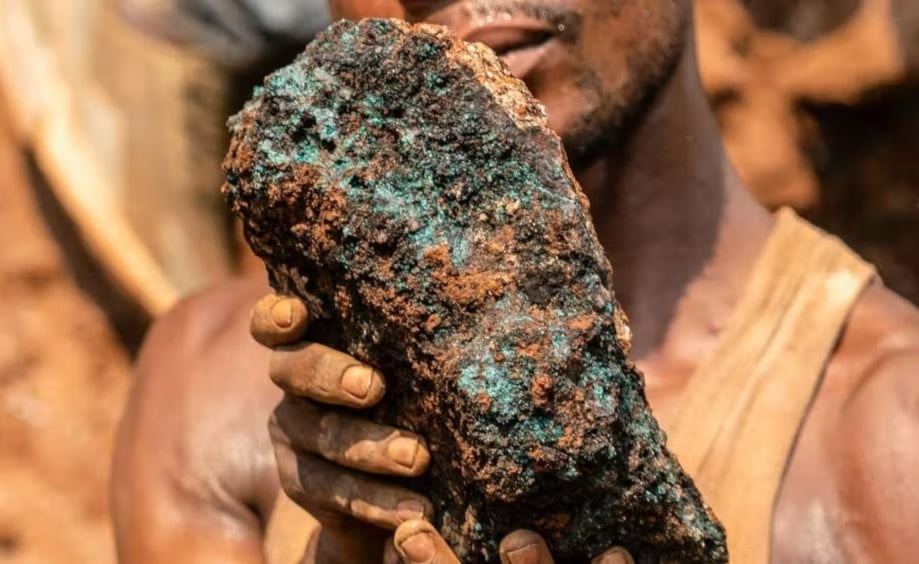US eyes Congo minerals deal amid child labor concerns
As the US considers a minerals deal with Congo, charities warn that without formal support for artisanal miners, child labor and forced mining may increase.
-

An artisanal miner holds a cobalt stone at the Shabara artisanal mine near Kolwezi, Democratic Republic of the Congo. (Junior Kannah/AFP)
The United States is in negotiations with the Democratic Republic of the Congo (DRC) over a potential minerals agreement that could grant Washington access to critical resources in exchange for security support. However, human rights organizations are warning that without formal protections for the country’s informal mining sector, such a deal could exacerbate child labor and unsafe working conditions in one of the world’s most resource-rich but vulnerable regions.
Nonprofits like the Fair Cobalt Alliance (FCA) and academic observers say the inflow of US investment, especially in industrial mining, will inevitably stimulate artisanal and small-scale mining (ASM), where labor is often informal, underregulated, and dangerous.
“ASM is part of the mining fabric,” said David Sturmes, director of partnerships at the FCA. “Even if the US only invests in industrial mining, this will attract artisanal and small-scale mining.”
US seeks access to DRC’s strategic minerals
The DRC holds vast reserves of cobalt and copper, key materials for electric vehicle batteries, renewable energy, and military technology. Despite the presence of major mining companies, a significant share of the country's cobalt and copper is mined artisanally, often with limited oversight and high human cost.
Last December the DRC filed lawsuits in Paris and Brussels against Apple’s European subsidiaries, accusing the company of sourcing "blood minerals" illegally mined in its conflict-ridden regions.
According to estimates, the country’s ASM sector includes around 2 million workers, many of whom are children. With copper prices rising, artisanal mining of the metal has surged, while cobalt production has slowed due to falling prices.
Those familiar with Congo’s mining ecosystem say foreign investment without safeguards could lead to increased use of child labor and dangerous extraction methods.
Artisanal mining raises labor and safety concerns
Artisanal mining often takes place on the periphery of industrial concessions, using rudimentary tools and without adequate safety precautions. “Mine shafts tens of meters deep are dug out by hand,” said Dorothée Baumann-Pauly, director of the Geneva Center for Business and Human Rights, “and that has led to numerous accidents and fatalities.”
Baumann-Pauly added that such mining can cause tensions with industrial firms, and that without integration into formal frameworks, informal digging tends to increase. “If you invest without any framework, it will cause havoc on the ground with unregulated digging,” she warned.
"Global buyers engaging in a futile attempt to avoid cobalt associated with ASM ignore the inconvenient truth that it is nearly impossible to separate the flow of ASM cobalt from the larger supply of industrially mined cobalt" Baumann-Pauly #DRC #Congo https://t.co/vgRln2cw9g
— Friends of the Congo (@congofriends) April 27, 2024
The Biden administration had previously acknowledged that artisanal mining material likely entered the global supply chain and pushed for improvements. “Child labor continues to be a real issue in the copper/cobalt space,” Sturmes noted, “but the appropriate response isn’t to exclude small-scale mining. Long-term systemic support is key.”
NGOs urge formalization of Congo’s informal mining sector
In 2023, the US Agency for International Development (USAID) announced it would offer grants to companies sourcing critical minerals from the DRC, including those working with artisanal miners. The US Labor Department also initiated efforts to improve labor conditions.
But according to Eric Kalala, CEO of Entreprise Générale du Cobalt (EGC), a state-owned entity created to formalize ASM, those grants have since been cut. “We are still in close contact with those organizations,” Kalala said, stressing the importance of stakeholder collaboration to ensure responsible sourcing.
Earlier this year, the Congolese government introduced a revised mining law that offers a legal framework for integrating artisanal miners into formal concession sites, enabling safer work environments and supervision. The move has been welcomed by several rights groups.
“Our focus is transparency to improve workers’ conditions, revenue, and enhance the image of the country and the strategic commodity that is cobalt,” Kalala added.

 4 Min Read
4 Min Read










